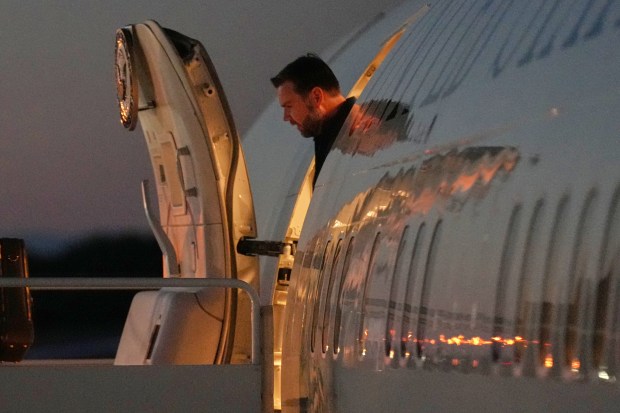Rooting for a Chicago sports team is the definition of delayed gratification. Not a single one of the big five pro franchises — the Bears, Cubs, Bulls, Blackhawks and White Sox — has been a champion since 2016, when the Cubs finally won a World Series only to fall back into mediocrity.
Now two of our teams, the White Sox and the Bears, are testing fan loyalty in a different way as they seek new homes — and taxpayer money to help finance them. It’s a modern sports conundrum: Chicago is a sports town, with its civic identity inextricably linked to its pro franchises. But as much as we love our teams, Chicagoans aren’t interested in giving the teams’ wealthy owners public dollars to build fancy new palaces.
Unbinding this Gordian knot was not why Mayor Brandon Johnson sought elected office, but it’s on him to figure out how to keep Chicago sports whole without draining the public coffers.
Our sports devotion runs deep. Four of every five Chicago-area adults say they’re a fan of at least one of the city’s major league teams, according to The Harris Poll. A majority (57%) of Chicago and Cook County residents call themselves devotees of the Bears, while roughly half follow the Bulls and the Cubs and 2 out of 5 root for the Blackhawks and White Sox.
Running as deep is the itch by the Bears and the White Sox to move. The Bears have conducted a very public search for a new home, even buying property in Arlington Heights for a domed stadium, though with negotiations faltering there over tax breaks, they are eyeing a spot in the city, near Soldier Field. The Sox, for the time being at least, are pitching a sport-entertainment complex in the South Loops, though owner Jerry Reinsdorf continues to flirt with Nashville, Tennessee, as both a fallback and negotiating lever.
Both teams reportedly want public funds — from the same pot of money, no less — to help them build their new fields.
But that’s where most city and suburban residents alike draw the line, according to our polling. Virtually everybody here (94%) says sports are an important part of Chicago’s culture, and three-quarters of Chicagoland adults agree that losing a pro team would hurt the city. But 60% also say public funding of a sports stadium is a bad use of taxpayer money. (This puts them at odds, by the way, with Americans as a whole; a slight majority of the country endorses public financing of pro sports facilities.)
The Chicago findings are meaningful. Even if every non-sports fan in our poll is against public subsidies for sports owners, half of all self-identified fans would have to concur to reach that 60% supermajority.
And those opposed aren’t wrong. U.S. taxpayers have laid out more than $4 billion for pro sports arenas since 2000, with the pace reaching a new project every month last year. Proponents argue that these are worthwhile investments because they create jobs and buoy the local economy. But 30 years of economic studies belie that assertion. “It just goes to show that policy decisions don’t seem to be tied to actual knowledge,” J.C. Bradbury, a Kennesaw State University economics professor who has extensively researched the issue, told USA Today.
What’s a city to do? The good news is that there’s recent precedent for the city to both save its money and its team. Nearly a dozen years ago, the Ricketts family, which owns the Cubs, and private investors plunked down $550 million to update Wrigley Field after then-Mayor Rahm Emanuel refused to kick in city funds. Negotiations were contentious — the Ricketts family reportedly contemplated moving the team altogether — but the Cubbies stayed and famously capped off the renovation with a World Series trophy.
Circumstances are different this year, to be sure — different mayor, different teams, different owners, different building plans, different economy. But the fundamentals are sufficiently similar to see a path forward. What’s required now is creative leadership from City Hall and some civic spirit from the Bears and White Sox.
Johnson has an opportunity to engage with not only the teams but also Chicagoland as a community to find ways to facilitate new facilities without opening the municipal strongbox. The mayor should also engage the business community, which has a vested interest in ensuring that Chicago remains a sports town, filled on game days with locals and tourists.
Successfully executed, these new in-city stadiums could serve as a model for other areas of public-private partnership. Then we can all get back to the usual business of bemoaning the teams’ on-field performance. This is still Chicago sports, after all.
Will Johnson is the Chicago-based CEO of The Harris Poll, one of the world’s leading public-opinion research firms.



